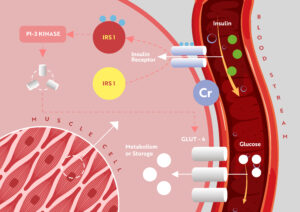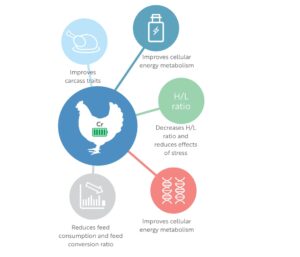Managing heat stress in poultry remains a major concern for both producers and scientists. It accounts for an annual loss of $128 to $165 million in the poultry industry alone. The impact of heat stress results in a drastic change in physiological activity linked with a decrease in feed consumption, growth rate, eggshell quality sand biochemical change like increase in the level of glucocorticoids. This leads to reduced immunity, and breakdown of muscle due to gluconeogenesis and the upward surge of this glucocorticoids will lead to the insensitivity of insulin.
During heat stress, there are an excess loss of minerals (iron, zinc, manganese and chromium) and vitamins (vitamin A, C, and E) in birds leading to mineral and vitamin deficiency(Kumari and Nath, 2018).To overcome heat stress in birds’ managemental measures (early heat acclimatizing and cooling systems) and nutritional strategies (early feed restriction, electrolyte, vitamin, and mineral balance) are practised.
Nowadays Chromium supplementation in the heat stress condition is gaining importance in poultry nutrition due to its wide range of roles in birds physiology.
- Chromium is an essential element required for carbohydrate, fat, and protein metabolism (Anderson, 1987)
- Chromium is considered a preferential mineral in poultry diets due to its robust antioxidant activities to avert lipid peroxidation caused by Heat stress (Rao et al., 2012).
- Trivalent chromium is a module of glucose tolerance factor (GTF), which contributes to glucose metabolism by enhancing the effect of insulin (Mertz, 1993).
- It is documented that chromium chelate with organic compounds have lower toxicity and higher bioavailability than inorganic chromium forms (Piva et al., 2003).
- The heterophil-to-lymphocyte ratio is considered a reliable index for determining stress in poultry. Bahrami et al., 2012 found decreases in H:L ratios with organic chromium supplementation in heat-stressed chicks reason may be due to decreased secretion of glucocorticoid.
- Serum IgG levels in broiler chicks fed chromium supplementation were higher than in the control group(Toghyani et al. 2007).
Mode of action:
The reduction in serum cortisol is one of the principal mechanisms by which chromium lessens heat stress-related depression in immunocompetent broiler chicks. Cortisol, the furthermost important glucocorticoid, is known to be immunosuppressive, inhibiting the production and actions of antibodies, lymphocyte function, and the leukocyte population. Supplemental chromium lightens the adverse effects of heat stress on broiler performance parameters associated with oxidative stress, as replicated by the reduced severity of catabolic profile through controlling the expressions of glucose transporter-2 in the liver, as well as glucose transporter-4, NF-κB, and Nrf2 in muscle
How much to supplement on poultry ration during summer !
Supplementation of chromium in poultry diet is an established concept in modern poultry nutrition and there are several recommendations based on different studies. Most commonly nutritionists recommend 400 to 600 ppb for better performance in broiler, layer and breeder flocks.
There are several forms of chromium available in the market to supplement in animal feed. Inorganic forms of chromium are poorly absorbed, for example 0.4-3% of inorganic chromium salts can be absorbed, while the absorption of chromium bound with organic compounds is distinctly higher and ranges between 10 and 25% (Toghyani et al. 2008)



